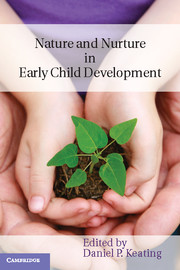Book contents
- Frontmatter
- Contents
- Contributors
- Acknowledgments
- Introduction
- 1 Biological and Experiential Influences on Psychological Development
- 2 Neural Development and Lifelong Plasticity
- 3 Mother and Child: Preparing for a Life
- 4 Early Experience and Stress Regulation in Human Development
- 5 Biology and Context: Symphonic Causation and the Distribution of Childhood Morbidities
- 6 Understanding Within-Family Variability in Children's Responses to Environmental Stress
- 7 Origins, Development, and Prevention of Aggressive Behavior
- 8 Mental Health Intervention in Infancy and Early Childhood
- 9 Bringing a Population Health Perspective to Early Biodevelopment: An Emerging Approach
- 10 Society and Early Child Development: Developmental Health Disparities in the Nature-and-Nurture Paradigm
- Index
Introduction
Published online by Cambridge University Press: 03 May 2011
- Frontmatter
- Contents
- Contributors
- Acknowledgments
- Introduction
- 1 Biological and Experiential Influences on Psychological Development
- 2 Neural Development and Lifelong Plasticity
- 3 Mother and Child: Preparing for a Life
- 4 Early Experience and Stress Regulation in Human Development
- 5 Biology and Context: Symphonic Causation and the Distribution of Childhood Morbidities
- 6 Understanding Within-Family Variability in Children's Responses to Environmental Stress
- 7 Origins, Development, and Prevention of Aggressive Behavior
- 8 Mental Health Intervention in Infancy and Early Childhood
- 9 Bringing a Population Health Perspective to Early Biodevelopment: An Emerging Approach
- 10 Society and Early Child Development: Developmental Health Disparities in the Nature-and-Nurture Paradigm
- Index
Summary
For developmental scientists, the nature versus nurture debate has been settled for some time. Neither nature nor nurture alone provides the answer. It is always nature and nurture in concert that shape developmental pathways and outcomes, from health to behavior to competence. In recent years, this insight has moved far beyond the commonplace assertion that both nature and nurture matter, progressing into the far more complicated and fascinating terrain of understanding how they interact over the course of development. This research arena has benefited from the emergence of new tools and techniques, enabling the field to gather information on the biological processes underlying child development and to analyze more complex information in more sophisticated ways that enable a clearer view of nature-nurture interactions in operation. Another significant change has been the steady accumulation of longitudinal data sets that permit the study of developmental trajectories from birth, or even prenatally, to adolescence and into adulthood.
A NEW PARADIGM FOR EARLY CHILD DEVELOPMENT
The convergence of these factors – the uptake of a nature-and-nurture model into research endeavors on many fronts, the emergence of new research tools and techniques, and the accumulation of developmental databases to which they can be applied – has set the stage for a major expansion of knowledge about human development. Much of this work has focused the field's attention on early child development as a key period within which many of these important interactions are occurring, with significant influences on the subsequent developmental trajectories for which they provide the foundation.
Information
- Type
- Chapter
- Information
- Nature and Nurture in Early Child Development , pp. 1 - 6Publisher: Cambridge University PressPrint publication year: 2010
